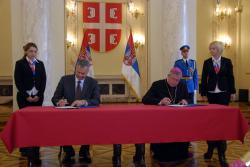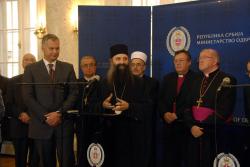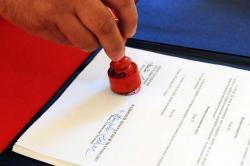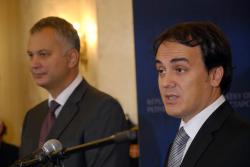- About MoD
Minister and Associates
- Minister
- State Secretary
- Assistant Ministers
- Secretary of the Ministry of Defence
Sectors
- Defence Policy Sector
- Human Resources Sector
- Material Resources Sector
- Budget and Finanance Sector
- Sector for Infrastructure and Hospitality Services
- SAF
- Documents
- Services
- Sport
- Archive
- Contacts
18.10.2011.
Signing of agreements with the representatives of religious communities in Serbia
 Minister Sutanovac and six representatives of traditional churches and religious communities signed today in the grand war hall agreements regulating the performance of religious services in the Serbian Army.
Minister Sutanovac and six representatives of traditional churches and religious communities signed today in the grand war hall agreements regulating the performance of religious services in the Serbian Army.On behalf of the churches and religious communities the agreements were signed by Archbishop of the Roman Catholic Church in Belgrade Monsignor Stanislav Hocevar, Bishop Samuel Vrbovsky of the Slovak Evangelical Church, bishop of the Reformed Christian Church Istvan Cete Shemeshi, superintendent of the Evangelical Christian Church Arpad Dolinski, Reis-ul-Ulema of Islamic Community of Serbia Adem Efendi Zilkic and president of the Association of Jewish Communities in Serbia Aleksandar Necak and Rabbi Isaac Asiel.
 "It's hard to imagine modernization without observing the tradition, just as it is difficult to appreciate the tradition if the company fails to modernize. Today's act brings back the tradition of the Serbian army in a modern and contemporary way, above all, respecting the needs of the Army of Serbia, who have to perform the most difficult tasks therefore, faith is most needed in these situations, "said Sutanovac.
"It's hard to imagine modernization without observing the tradition, just as it is difficult to appreciate the tradition if the company fails to modernize. Today's act brings back the tradition of the Serbian army in a modern and contemporary way, above all, respecting the needs of the Army of Serbia, who have to perform the most difficult tasks therefore, faith is most needed in these situations, "said Sutanovac.Sutanovac said that today's signing of agreements with all the traditional religious communities in Serbia proves that the Serbian Army lives and wants to continue living and multiethnic and multicultural, respecting the rights of all citizens. Religious service in the Army, he added, is the basic need of ordinary soldiers, NCOs and officers.
-
 This is the result of great trust deposited in the Army of Serbia which had been lost in the previous period. After 66 years in the Army we have today, religious representatives and the need for their presence, both at our military academy where every year we get new cadets of different religions, and in the army. We believe that this is an excellent example of how Serbia can be a modern and prosperous country that respects human rights and minority rights as well as various religious communities - said Sutanovac.
This is the result of great trust deposited in the Army of Serbia which had been lost in the previous period. After 66 years in the Army we have today, religious representatives and the need for their presence, both at our military academy where every year we get new cadets of different religions, and in the army. We believe that this is an excellent example of how Serbia can be a modern and prosperous country that respects human rights and minority rights as well as various religious communities - said Sutanovac.Religion and Diaspora Minister Srdjan Sreckovic said that as of today the Serbian Army is beginning to be similar to all modern armies in the free world. He said he believes this is another important contribution to the advancement of human rights, good relations between people regardless of their nationality and religion.
-
 The religious service was restored after 66 years in the Army, with traditional religious groups, has the highest confidence of the citizens of Serbia on the basis of opinion polls. It is important that they work together on projects that promote the development of our society and promote tolerance, human rights and religious freedom - the minister said Sreckovic.
The religious service was restored after 66 years in the Army, with traditional religious groups, has the highest confidence of the citizens of Serbia on the basis of opinion polls. It is important that they work together on projects that promote the development of our society and promote tolerance, human rights and religious freedom - the minister said Sreckovic.The signing was attended by Minister of Religion and Diaspora Srdjan Sreckovic Government of Serbia, the Serbian Orthodox Church Bishop Porfirije, State Secretary in the Ministry of Defence Igor Jovicic, Chief of the Serbian Army General Staff General Miloje Miletic including other representatives of the Ministry of Defense and the Army of Serbia.
The adoption of the Serbian Army Law in December 200 created the conditions for an organized religious service in the Serbian Armed Forces. In June this year, on St. Vitus Day, an agreement was signed with the Serbian Orthodox Church. Chaplains will, as planned, have a label on your lapel as a sign of religious service members. For example, officers, members of religious services and members of the Serbian Orthodox Church, will wear a trefoil cross, while the Roman Catholic priests will have a Latin cross, a and military imams will wear a crescent.
It is planned that some 100 to 500 members of certain traditional churches and religious communities in the defense system shall be employed as priests. Two priests will be assigned to 500 to 1,000 members, while another chaplain will be assigned to another thousand members of the army.
Members of religious services, and chaplains will not carry weapons, and will strictly keep the secrecy of confession and of the defense system. They will also serve as Advisors to the Commander.
The religious service in the Serbian army has a long tradition. As early as 1918 in the Kingdom of Serbia within the command staff, there was a military priest, while chaplains were assigned to the command headquarters, divisional headquarters and in the active regiments.
After the First World War in the Kingdom of Serbs, Croats and Slovenes, the Ministry of the Armed forces and there was a body which supervised the chaplain service, each denomination had one chaplain for the Orthodox, Roman Catholic and Muslim religion. Chief chaplain (officer) for the Orthodox faith falls under the ecclesiastical jurisdiction of the Serbian Patriarchy. For the soldiers, liturgies and other ceremonies were held in chapels and churches in the circle of military facilities, and where there were none, the local religious establishments.
 PHOTOGALLERY
PHOTOGALLERY- About MoD
- Jurisdiction
- Organisation scheme
- Description of duties
- Minister and Associates
- Minister
- State Secretary
- Assistant Ministers
- Secretary of the Ministry of Defence
- Sectors
- Defence Policy Sector
- Human Resources Sector
- Material Resources Sector
- Budget and Finanance Sector
- Sector for Infrastructure and Hospitality Services
- Special Internal Units
- Secretariat
- Office of the Minister of Defence
- Military Attorney's Office
- Administrative Bodies within MoD
- Defence Inspectorate
- Military Intelligence Agency
- Military Security Agency
- Autonomous Departments
- Public Relations Department
- Military Healthcare Department
- Higher Education Institution
- Defence University
- Specific internal units
- Inspector General of the Services
- Internal Audit Section
- SAF
- Documents
- Services
- Sport
- Archive
- Contacts


